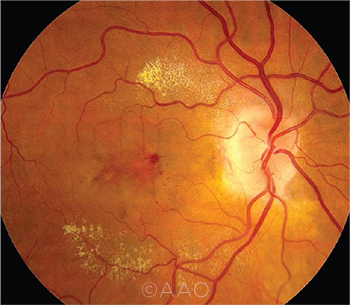Download PDF
The biosimilar ophthalmic drug FYB201 (bioeq/Formycon) is clinically equivalent to ranibizumab for treating neovascular age-related macular degeneration (AMD), an international team of researchers has reported.1
“The study showed noninferiority between the biosimilar FYB201 and the reference product, ranibizumab,” said coauthor Peter K. Kaiser, MD, at the Cleveland Clinic’s Cole Eye Institute. He added, “Biosimilars are different from generic medications and require different regulatory hurdles. However, the study did show noninferiority, which would suggest similar efficacy.”
 |
HEADED TO MARKET? If approved, biosimilars could lower the financial burden of AMD treatment.
|
Study specifics. For the prospective phase 3 study, treatment-naive patients with wet AMD were evaluated at centers in 12 countries. Participants were randomized to receive monthly injections of either FYB201 (n = 238) or 0.5 mg ranibizumab (n = 239).
At 48 weeks, data were available on 199 patients who had received FYB201 and 189 in the ranibizumab cohort. Mean improvement in best-corrected visual acuity was 8.0 letters in both groups (7.8 ± 11.7 vs. 7.1 ± 10.42 letters for the FYB201 and ranibizumab recipients, respectively). The frequency and type of adverse events were comparable between the two groups, and most side effects were mild or moderate.
Given these results, Formycon announced in March that it will ask this year for approval of FYB201 as a biosimilar to ranibizumab in the United States and Europe. The company, based in Germany, said it is prepared for quick commercialization of the drug.2
Additional thoughts on biosimilars. FYB201 is not the only potential biosimilar for AMD treatment on the regulatory horizon. A second possible biosimilar to ranibizumab, SB11 (Samsung Bioepsis/Biogen), is under review at the FDA and the European Medicines Agency, based on positive outcomes reported last fall from a smaller, shorter-term clinical trial.3,4
Although follow-up remains to be done to show FYB201’s longer-term safety, its approval as a biosimilar would have some potential advantages for ophthalmologists who treat AMD, Dr. Kaiser said. “Biosimilars in general have a much lower cost to obtain regulatory approval and as such are cheaper than the reference product. Moreover, approval in one indication garners approval for all the reference product’s indications, again lowering the cost.” (For more, see “Biosimilars in Ophthalmology,” in the January 2021 EyeNet.)
Finally, how might FYB201 affect bevacizumab, the off-label alternative for treating retinal diseases? It won’t. “Bevacizumab is not a biosimilar,” Dr. Kaiser said. “It is a different medication with different binding coefficient, different molecular structure, and different efficacy in some indications, such as diabetic macular edema.” Moreover, he added, “there is a biosimilar of bevacizumab that is currently in phase 3 clinical testing for ophthalmic use.”
—Linda Roach
___________________________
1 Holz FG et al. Ophthalmology. Published online May 3, 2021.
2 www.formycon.com/en/press-release/formycon-confirms-bla-submission-strategy-and-timeline-for-its-lucentisr-biosimilar-candidate-fyb201-following-consultation-with-the-fda/. Accessed May 21, 2021.
3 www.globenewswire.com/news-release/2020/11/18/2129054/0/en/Samsung-Bioepis-and-Biogen-Announce-FDA-Filing-Acceptance-of-SB11-A-Proposed-Biosimilar-Referencing-Lucentis-ranibizumab.html. Accessed May 21, 2021.
4 Woo SJ et al. JAMA Ophthalmol. 2021;139(1): 68-76.
___________________________
Relevant financial disclosures—Dr. Kaiser: Allergan: C; Bayer Healthcare Pharmaceuticals: C,L; bioeq/Formycon: C; Boehringer Ingelheim: C; Genentech: C; Kanghong: C; Novartis: C,L; Regeneron: C,L.
For full disclosures and the disclosure key, see below.
Full Financial Disclosures
Dr. Cheng Singapore National Medical Research Council: S.
Dr. Jeng EyeGate Pharmaceuticals: O; GlaxoSmithKline: C; Kedrion: C; Merck: C; Sanofi: C; Santen: C.
Dr. Kaiser Aerie: C; Aerpio: C; Allegro: C; Allergan: C; Bayer Healthcare Pharmaceuticals: C,L; Biogen: C; Boehringer Ingelheim: C; Clearside: C; Eyevensys: C; Formycon: C; Galecto: C; Galimedix: C; Genentech: C; Glaukos: C; iRenix: C; Iveric Bio: C,O; jCyte: C; kala: C; Kanghong: C; Kodiak: C; Novartis: C,L; Omeros: C; Opthea: C; Oxurion: C; Regeneron: C,L; RegenxBio: C; Retinal Sciences: C,O; Santen: C; Stealth: C; Verana: O.
Dr. Phylactou None.
Disclosure Category
|
Code
|
Description
|
| Consultant/Advisor |
C |
Consultant fee, paid advisory boards, or fees for attending a meeting. |
| Employee |
E |
Employed by a commercial company. |
| Speakers bureau |
L |
Lecture fees or honoraria, travel fees or reimbursements when speaking at the invitation of a commercial company. |
| Equity owner |
O |
Equity ownership/stock options in publicly or privately traded firms, excluding mutual funds. |
| Patents/Royalty |
P |
Patents and/or royalties for intellectual property. |
| Grant support |
S |
Grant support or other financial support to the investigator from all sources, including research support from government agencies (e.g., NIH), foundations, device manufacturers, and/or pharmaceutical companies. |
|
More from this month’s News in Review